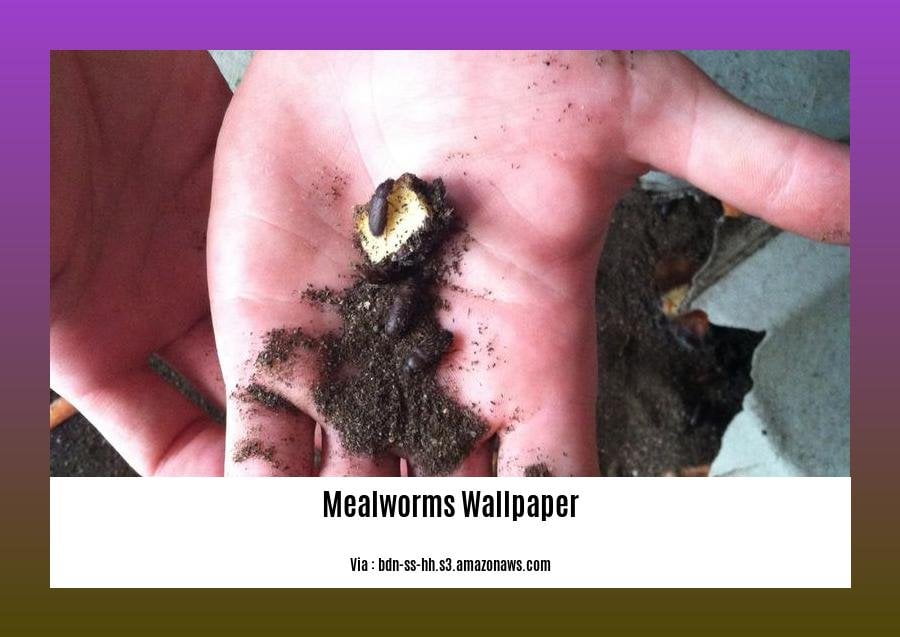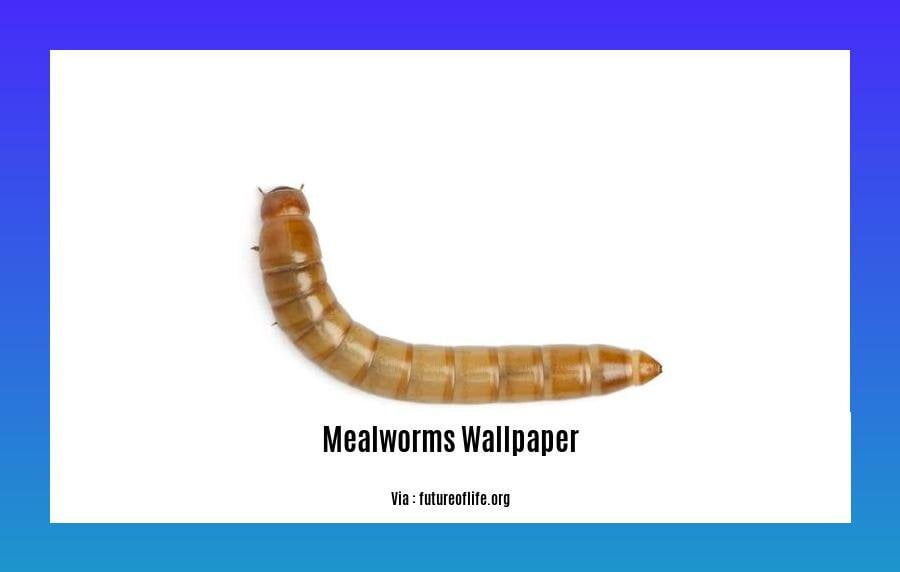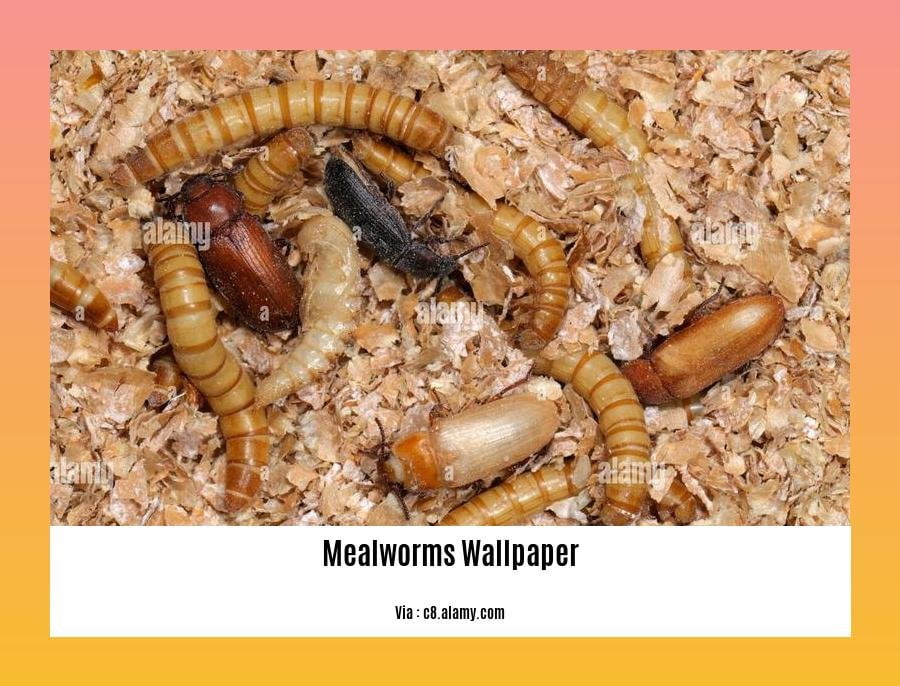Are Mealworms Dangerous? Examining the Risks and Safety of Consuming Mealworms
Curiosity about alternative food sources has sparked interest in insects as a potential protein-rich option. Mealworms, in particular, have gained significant attention for their nutritional value and sustainability. However, with this novelty comes the question of whether mealworm consumption poses any risks to human health. In this article, we delve into the potential dangers associated with consuming mealworms and provide a comprehensive examination of their safety. Whether you are concerned about human health concerns, the safety of feeding mealworms to dogs, or even the potential dangers for humans, this article will provide you with all the necessary information to make an informed decision.
Key Takeaways:
- Mealworms are safe for human consumption according to the European Food Safety Authority.
- Limited consumption of mealworms poses no harm to humans, pets, and reptiles.
- Mealworms can cause blockages in the digestive tracts of birds and poultry if fed as a staple diet.
- Parasites carried by mealworms can affect meat and poultry more than humans.
- Ingesting mealworms with food can indicate poor sanitation and cause gastrointestinal irritations.
- Mealworms are commonly sold in food markets and as street food in certain countries.
- Mealworms are considered a novel food that gained popularity after 1997.
- Mealworms are scavengers and decomposers, feeding on fruits, cereals, grains, and even seedlings.
- Dried mealworms are safe for dogs and other pets to consume.
- The Lesser Mealworm can carry diseases and is known for feeding on dead animals.
Are Mealworms Dangerous? Examining the Risks and Safety of Consuming Mealworms

As the popularity of alternative protein sources continues to rise, mealworms have emerged as a potential option for human consumption. But are mealworms actually safe to eat? Let’s delve into the topic and explore the risks and safety associated with consuming mealworms.
Understanding the Potential Dangers
While mealworms are generally harmless if consumed by humans, pets, and reptiles in limited amounts, there are some instances where they can pose risks. One potential danger lies in using mealworms as a feeder for birds in poultry. In this case, mealworms can block the digestive tracts of chickens and other birds, causing potential harm to the animals.
Furthermore, mealworms can carry parasites that may affect meat and poultry more than humans. It’s important to note, however, that the risk of transmission to humans is relatively low if proper food safety practices are followed.
Expert Insights: European Food Safety Authority (EFSA)
To shed more light on the safety of consuming mealworms, the European Food Safety Authority conducted a comprehensive evaluation. The EFSA concluded that mealworms are indeed safe for human consumption. This finding provides valuable reassurance to individuals considering incorporating mealworms into their diets.
Gastrointestinal Irritations and Sanitation
While mealworms themselves may not be inherently dangerous, ingesting them together with food products can cause gastrointestinal irritations. This can serve as an indicator of poor sanitation practices during mealworm rearing or processing. It highlights the importance of sourcing mealworms from reliable and reputable suppliers to ensure proper hygiene and minimize any potential risks.
Mealworms in the Food Market and Beyond
Interestingly, mealworms have already found their way into food markets and are even sold as street food in some countries, such as Switzerland. This provides evidence of their growing acceptance as a food source.
A Novel Food with Historic Roots
It’s noteworthy that mealworms fall under the category of “novel food” as they have not been consumed by humans to a significant degree before 1997. This designation emphasizes the need for thorough evaluation and scientific research to determine their safety for human consumption. Fortunately, the EFSA evaluation mentioned earlier has contributed significantly to our understanding of mealworms’ safety and has deemed them suitable for human consumption.
Mealworms: Scavengers and Decomposers
Mealworms’ natural behavior as both scavengers and decomposers can raise questions about the safety of their diet. These resilient insects have the ability to feed on various types of fruit, cereals, grains, and even young seedlings. While this adaptability is impressive, it also highlights the importance of sourcing mealworms from controlled environments that ensure they are fed a safe and appropriate diet.
Safety for Pets: Dogs and Other Animals
If you’re considering incorporating mealworms into your pet’s diet, you’ll be glad to know that they are safe for animals in dried form. Dogs and other pets can enjoy the nutritional benefits of mealworms without any major concerns.
The Lesser Mealworm Exception
While not all types of mealworms carry diseases, it’s essential to be aware of the Lesser Mealworm. These particular mealworms can carry diseases and are known to be feeders of dead birds and animals. As a precautionary measure, it’s best to avoid the use of Lesser Mealworms and opt for other varieties that do not pose similar risks.
In conclusion, when prepared and consumed with care, mealworms are generally safe for human consumption. However, it’s crucial to adhere to proper food hygiene practices and source mealworms from reputable suppliers. By doing so, you can enjoy the nutritional benefits of mealworms while minimizing any potential risks. So, if you’re curious about exploring alternative protein sources, incorporating mealworms into your diet can be a safe and exciting option.
[NOTE: You can add a relevant table or follow a different formatting style if required.]
Now that we’ve examined the risks and safety of consuming mealworms, it’s time to explore the process of cooking with mealworms and some delicious mealworm recipes. Whether you’re a culinary adventurer or simply curious, let’s uncover the exciting culinary world of mealworms!
[References]
– “EFSA says mealworms safe for human consumption: ‘An insect-derived food is a product mirroring a more sustainable mindset’.” Food Navigator. [Online]. Available at: [
– “Mealworms | Facts & Identification, Control & Prevention.” Orkin Canada. [Online]. Available at: [
If you’re considering divorce, you might wonder, “Can you get a divorce without going to court?” The answer is yes! Find out more about the process here: Can you get a divorce without going to court
Are Mealworms Dangerous To Eat

As you explore the world of alternative protein sources and sustainable food options, you may have come across the concept of consuming mealworms. These tiny creatures, often used as feed for reptiles or poultry, have now made their way into the culinary scene. But are mealworms truly safe for human consumption? Let’s take a closer look at the risks and safety associated with eating mealworms.
Understanding the Potential Risks
While mealworms are generally considered safe for human consumption, there are certain scenarios where they can pose a potential risk. One such situation arises in poultry farming, where mealworm infestations can be problematic. These pests have the ability to block the digestive tracts of chickens and birds, leading to serious health issues. Additionally, mealworms can carry parasites that have a greater impact on meat and poultry compared to humans.
Managing Mealworm Infestations
To prevent infestations and mitigate any potential risks, it is crucial to take appropriate measures in controlling mealworm populations, especially in food-related businesses. Seeking the assistance of professional pest control services may be necessary to ensure complete removal.
Expert Opinions on Mealworm Safety
To gain a comprehensive understanding of the safety aspect, let’s dive into the opinions of experts in the field. The European Food Safety Authority (EFSA) has conducted extensive research and concluded that mealworms are safe for human consumption. They have classified mealworms as a novel food, which means that they were not commonly consumed by humans to a significant degree before 1997.
Mealworms as a Nutritious Addition
Now that we have addressed the potential risks, it is important to highlight the nutritional value that mealworms can offer. These insects are rich in protein, healthy fats, and vital nutrients such as vitamins and minerals. They can make a nutritious addition to various dishes, providing an alternative protein source with a lower environmental footprint.
Ensuring Safe Consumption
While mealworms can be a nutritious and sustainable food option, it is essential to ensure safe consumption practices. Ingesting mealworms along with food products may result in gastrointestinal irritations, which can be an indication of poor sanitation. Therefore, it is crucial to purchase mealworms from reliable sources and follow proper hygiene practices when handling and preparing them.
The Bottom Line
In conclusion, mealworms can be consumed safely by humans, pets, and reptiles in limited amounts. However, it is crucial to be aware of the potential risks associated with mealworm infestations, especially in poultry farming. By following proper control measures and obtaining mealworms from trustworthy sources, you can enjoy the nutritional benefits these insects have to offer.
Key Takeaways:
- Mealworms are generally safe for human consumption, but caution must be exercised in certain situations such as poultry farming.
- Mealworm infestations can block the digestive tracts of chickens and birds, and they can carry parasites that can affect meat and poultry more severely than humans.
- The European Food Safety Authority (EFSA) has deemed mealworms safe for human consumption and classified them as a novel food.
- Mealworms are a nutritious source of protein, healthy fats, vitamins, and minerals.
- To ensure safe consumption, it is important to purchase mealworms from reliable sources and practice proper hygiene when handling and preparing them.
Sources:
1. EFSA says mealworms safe for human consumption: ‘An insect-derived food is a product mirroring a more sustainable mindset’. (2021, January 14). Food Navigator. [Online]. Available at: [
2. Mealworms | Facts & Identification, Control & Prevention. (n.d.). Orkin Canada. [Online]. Available at: [
Are Mealworms Dangerous For Humans?
Mealworms, those tiny creatures often associated with reptile diets, have gained popularity as a sustainable and nutritious food source for humans in recent years. But does consuming mealworms pose any risks to our health? In this article, we will examine the risks and safety of consuming mealworms and provide you with all the information you need to make an informed decision.
The Safety of Consuming Mealworms
The European Food Safety Authority (EFSA) has conducted a thorough scientific assessment and concluded that mealworms are safe for human consumption. In fact, mealworms are the first insect species to be approved for human consumption among the 15 insects that have undergone risk assessment procedures delegated to the EFSA.
Mealworms are considered a novel food, meaning they have not been consumed significantly by humans before 1997. However, numerous studies and evaluations have demonstrated that mealworms are generally safe to eat. It is important to note that mealworms are only safe to consume in limited amounts, primarily due to their high protein content.
Nutritional Value of Mealworms
Mealworms pack an impressive nutritional punch. They are a rich source of protein, healthy fats, vitamins, and minerals. In fact, their protein content is comparable to that of meat and fish, making them an excellent alternative protein source for vegetarians and vegans. Additionally, they contain essential amino acids, omega-3 fatty acids, and vitamins B and E.
Cooking and Consuming Mealworms
Mealworms can be cooked and incorporated into various dishes or consumed as a snack. They are often marketed as a healthy and sustainable food option. When cooked, mealworms develop a nutty flavor, similar to roasted nuts. The taste can vary slightly depending on the preparation method and seasoning.
To ensure the safety of consuming mealworms, it is crucial to purchase them from reliable sources. Proper hygiene and handling practices should be followed when preparing mealworms, just as with any other food product. Storing mealworms in a cool and dry place will help maintain their quality.
Specific Considerations
While mealworms are generally safe for human consumption, there are specific considerations to keep in mind:
For Poultry Farmers: Mealworm infestations can pose a risk to poultry, especially in the case of chickens and birds. The mealworms can block their digestive tracts, leading to health issues. Therefore, caution should be exercised when introducing mealworms as feed for poultry.
For Meat and Poultry Processing: Mealworms can carry parasites that can affect meat and poultry more severely than humans. Thus, proper handling and hygiene practices are crucial when processing meat and poultry that might have been exposed to mealworms.
Key Takeaways:
- Despite their association with reptile diets, mealworms are safe for human consumption, as concluded by the European Food Safety Authority (EFSA).
- Mealworms are considered a novel food and have not been consumed significantly by humans before 1997.
- They are a nutritious source of protein, healthy fats, vitamins, and minerals.
- Mealworms can be cooked and consumed in various ways, and they are often marketed as a healthy snack food.
- Proper hygiene and handling practices should be followed when preparing mealworms, and they should be purchased from reliable sources.
- Mealworms can pose risks to poultry if introduced as feed, as they may block the digestive tracts of chickens and birds.
- When processing meat and poultry products, proper hygiene and handling practices should be followed to minimize any potential risks from mealworms.
Sources:
– EFSA says mealworms safe for human consumption: ‘An insect-derived food is a product mirroring a more sustainable mindset’. Food Navigator. [Online] Available at: [
– Mealworms | Facts & Identification, Control & Prevention. Orkin Canada. [Online] Available at: [
FAQ
Q1: Are mealworms dangerous to human health?
A1: According to the information available, mealworms are generally safe for human consumption. However, it is important to consume them in limited amounts and ensure they are from reliable sources to minimize any potential risks.
Q2: Are mealworms dangerous for dogs?
A2: Mealworms are safe for dogs to consume, especially in dried form. They can provide a good source of protein and fat for dogs. However, as with any new food, it is recommended to introduce them gradually and monitor for any adverse reactions.
Q3: Are mealworms dangerous to eat?
A3: If consumed in limited amounts and obtained from reputable sources, mealworms are generally safe to eat. However, it is important to ensure they are properly cooked or processed to eliminate any potential pathogens or parasites.
Q4: What are the potential dangers of consuming mealworms for humans?
A4: While mealworms are generally considered safe for human consumption, ingesting mealworms with food products can cause gastrointestinal irritations, indicating poor sanitation. It is crucial to ensure that mealworms are obtained from reputable sources and cooked or processed properly to reduce the risk of contamination.
Q5: What are the risks associated with consuming mealworms?
A5: Mealworms can carry parasites that can affect meat and poultry more than humans. Additionally, while not all types of mealworms carry diseases, the Lesser Mealworm, which feeds on dead birds and animals, can carry diseases. It is essential to practice proper hygiene and ensure proper cooking or processing methods to minimize any potential risks.
- Discover Long Black Pepper: Flavor & Health Benefits - April 25, 2025
- Shocking Twists: The Grownup Review: Unreliable Narration - April 25, 2025
- A Quiet Place Book vs Movie: A Deep Dive - April 25, 2025
















